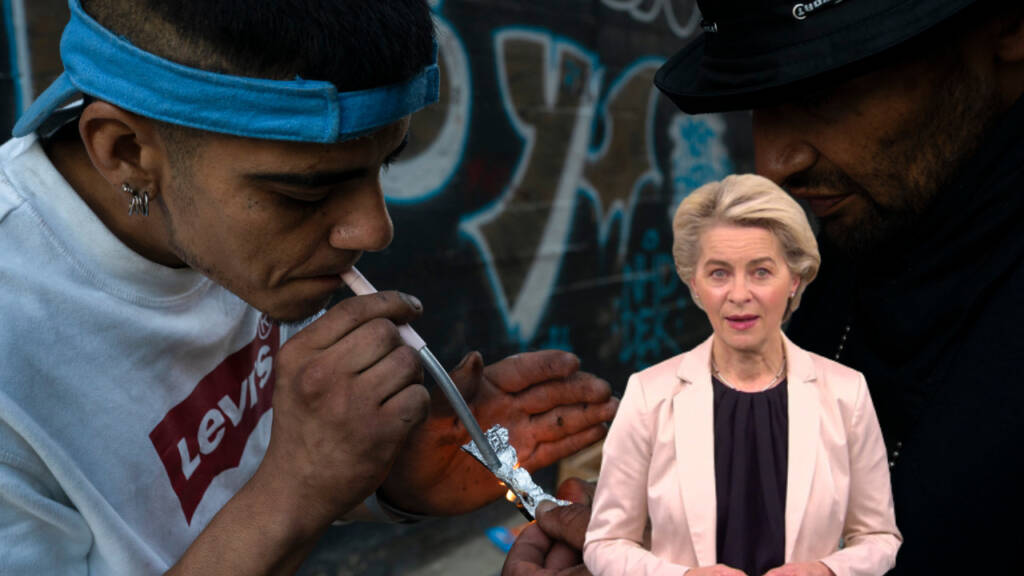An unusual and worrying phenomenon has emerged in Europe. An unexpected surge of drugs has permeated the continent, raising suspicions of a deliberate scheme.
A closer look at the underlying motivations of the situation is necessary given the possibility that this surge is planned to distract Europeans from the current hardships. According to a media report by POLITICO, Brussels is grappling with an influx of cracked cocaine, instigating a surge in criminal activities throughout the European Union’s capital city. Local inhabitants, when interviewed, expressed growing concern about the city’s transforming landscape, predominantly for the worse.
Belgium’s law enforcement data underscores an alarming escalation in drug-related crimes. Notably, the area surrounding the central police station registered 372 drug-related violations, averaging over one occurrence daily and constituting roughly 10% of the overall annual criminal incidents.
Comparing statistics, this marks a notable ascent from the prior years: 266 cases were documented in 2020, 172 in 2019, and merely 67 in 2018.
Belgium has truly witnessed a spectacular surge in drug consumption, spanning from heightened amphetamine use in 2022 to escalated cocaine usage in Brussels during 2021-2022.
Drugs commonized in Europe
This trend, however, merely initiates a broader concern evident in pan-European data and reports. The European Union’s narcotics monitoring reveals a burgeoning and diversified drug market, accompanied by heightened health hazards.
Moreover, amplified trafficking has engendered a rise in drug-linked violence, raising apprehensions about the escalating societal and public health implications across the European landscape.
There was a significant rise in drug seizures across the European Union between 2011 and 2022. Cocaine saw a staggering increase of 416%, followed by herbal cannabis (260%), methamphetamine (135%), heroin (126%), MDMA (ecstasy) (123%), cannabis resin (77%), and amphetamine (42%).
The report indicates that while there’s internal demand for these substances within the EU, it also cautions that the escalated quantities confiscated might partly signify Europe’s amplified role as a hub for production, export, and transit.
These drugs have obviously spread throughout European cities. Notably, cocaine interceptions in the Dutch port of Rotterdam reached 52.5 tons in 2022. Additionally, in 2022 at Antwerp, Belgian authorities found nearly 110 tonnes of cocaine, breaking the previous record and going over 100 tonnes for the first time.
Europe’s own cocaine production has skyrocketed too. The EMCDDA notes an escalation in cocaine production within the EU, with 45+ dismantled labs in 2022, up from 23 in 2020. In the EU, 87.4 million adults have experimented with illicit drugs.
The European Drug Report 2023, released in mid-June, underscores consistent substance availability. Illicit drug circulation is at a peak, exacerbated even by drug consumption legalization.
Read More: Drugs to cope up with PTSD, Zelensky land goes puff-puff
The Legalization of Drugs
While the illegal drug trade is horrifying, there is also a significant issue with the legalization of many drugs that no one wants to acknowledge. For the unaware, Belgium, a recent victim of this trend, was among the first countries in Europe to legalize drug use.
Belgium introduced a secure drug consumption facility near Midi station. This collaborative space, managed by Transit, provided users with clean resources, health monitoring, and consultations with nurses, and social workers.
Moreover, Germany’s recent move to legalize recreational cannabis resonates amidst the struggle against prevalent depression.
Switzerland is testing cannabis legalization, echoing a broader European trend. Scotland is pursuing drug decriminalization, while France, surprisingly, is also considering similar alterations in its drug policy.
These shifts reflect an evolving approach towards drug-related issues, potentially heralding transformative changes in societal and legal paradigms across the continent.
In the wake of the 2022 Ukraine war, the routine normalization and distribution of drugs throughout Europe has become unsettlingly commonplace. Strikingly, despite the extensive illegal drug network, European authorities appear incapable of halting its proliferation.
This raises a pertinent question: Is there an intentional alignment between the surge in drug normalization and European governments’ desire to divert their populace from the fatigue induced by the ongoing war?
Read More: If Trudeau denies this, Canada is doomed
To Distract from Reality
Notably, amidst the war, both Eastern and Western Europeans, comprising regular citizens and noteworthy politicians, extended their borders to accommodate millions of Ukrainian refugees. Moreover, the voluntary imposition of sanctions against Russia underscored Europe’s capacity to prioritize values over financial considerations.
However, as the war rages on, Europeans have entered into a phase where their daily life is becoming a misery. Amidst escalating hyperinflation and sluggish growth, Europe’s foundational values have eroded.
Dissent has started to grow against leaders and their policies, especially concerning Ukraine. Amidst war-induced depression, a dishearteningly common occurrence, drugs surprisingly infiltrated Europe’s landscape, further complicating the European hardships.
Read More: Ukraine is importing massive volumes of cocaine to keep its soldiers high and battle ready
Drugs serve as potent tools to detach individuals from their struggles, corroding mental well-being. Consequently, European governments’ leniency towards drug prohibition becomes disconcertingly apparent.
It’s high time Europeans awaken to this unsettling reality, as the fabric of their societal and personal stability teeters precariously on the brink.
Watch More:
